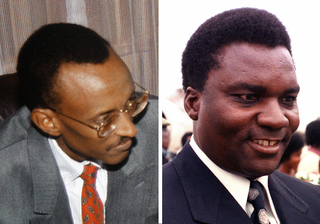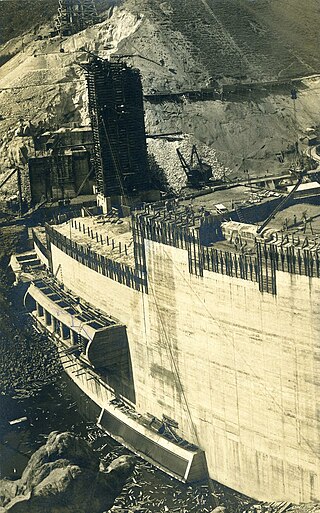| |||||
| Decades: | |||||
|---|---|---|---|---|---|
| See also: | Other events of 2009 List of years in Rwanda | ||||
The following lists events that happened during 2009 in Rwanda .
| |||||
| Decades: | |||||
|---|---|---|---|---|---|
| See also: | Other events of 2009 List of years in Rwanda | ||||
The following lists events that happened during 2009 in Rwanda .
Human occupation of Rwanda is thought to have begun shortly after the last ice age. By the 11th century, the inhabitants had organized into a number of kingdoms. In the 19th century, Mwami (king) Rwabugiri of the Kingdom of Rwanda conducted a decades-long process of military conquest and administrative consolidation that resulted in the kingdom coming to control most of what is now Rwanda. The colonial powers, Germany and Belgium, allied with the Rwandan court.

Juvénal Habyarimana was a Rwandan politician and military officer who was the second president of Rwanda, from 1973 until his assassination in 1994. He was nicknamed Kinani, a Kinyarwanda word meaning "invincible".

Paul Kagame is a Rwandan politician and former military officer who has been the President of Rwanda since 2000. He was previously a commander of the Rwandan Patriotic Front (RPF), a rebel armed force which invaded Rwanda in 1990. The RPF was one of the parties of the conflict during the Rwandan Civil War and the armed force which ended the Rwandan genocide. He was considered Rwanda's de facto leader when he was Vice President and Minister of Defence under President Pasteur Bizimungu from 1994 to 2000 after which the vice-presidential post was abolished.

The Interahamwe is a Hutu paramilitary organization active in the Democratic Republic of the Congo and Uganda. The Interahamwe was formed around 1990 as the youth wing of the National Republican Movement for Democracy and Development, the then-ruling party of Rwanda, and enjoyed the backing of the Hutu Power government. The Interahamwe, led by Robert Kajuga, were the main perpetrators of the Rwandan genocide, during which an estimated 500,000 to 1,000,000 Tutsi, Twa, and moderate Hutus were killed from April to July 1994, and the term "Interahamwe" was widened to mean any civilian militias or bands killing Tutsi.

The Rwandan genocide, also known as the genocide against the Tutsi, occurred between 7 April and 19 July 1994 during the Rwandan Civil War. During this period of around 100 days, members of the Tutsi minority ethnic group, as well as some moderate Hutu and Twa, were killed by armed Hutu militias. Although the Constitution of Rwanda states that more than 1 million people perished in the genocide, the demographic evidence suggests that the real number killed was likely lower. The most widely accepted scholarly estimates are around 500,000 to 662,000 Tutsi deaths.

Pasteur Bizimungu is a Rwandan politician who served as the third President of Rwanda, holding office from 19 July 1994 until 23 March 2000.

The Rwandan Civil War was a large-scale civil war in Rwanda which was fought between the Rwandan Armed Forces, representing the country's government, and the rebel Rwandan Patriotic Front (RPF) from 1 October 1990 to 18 July 1994. The war arose from the long-running dispute between the Hutu and Tutsi groups within the Rwandan population. A 1959–1962 revolution had replaced the Tutsi monarchy with a Hutu-led republic, forcing more than 336,000 Tutsi to seek refuge in neighbouring countries. A group of these refugees in Uganda founded the RPF which, under the leadership of Fred Rwigyema and Paul Kagame, became a battle-ready army by the late 1980s.

Rutshuru is a town located in the North Kivu province of the eastern Democratic Republic of the Congo, and is headquarters of an administrative district, the Rutshuru Territory. The town lies in the western branch of the Albertine Rift between Lakes Edward and Kivu. The Ugandan border is 15 km east and the Rwandan border is 30 km south-east. Lava flows from the Nyamuragira volcano, 40 km south-west, have come within 7 km of the town in recent years.

The Army for the Liberation of Rwanda was a rebel group largely composed of members of the Interahamwe and Armed Forces of Rwanda. Operating mostly in the eastern regions of the Democratic Republic of the Congo along the border with Rwanda, it carried out attacks throughout the Second Congo War against forces aligned with Rwanda and Uganda. In 2000, the ALiR agreed to merge with the Hutu resistance movement based in Kinshasa into the new Democratic Forces for the Liberation of Rwanda (FDLR). ALiR was largely supplanted by the FDLR by 2001.
Congolese history in the 2000s has primarily revolved around the Second Congo War (1998–2003) and the empowerment of a transitional government.

The Kivu conflict is an umbrella term for a series of protracted armed conflicts in the North Kivu and South Kivu provinces in the eastern Democratic Republic of the Congo which have occurred since the end of the Second Congo War. Including neighboring Ituri province, there are more than 120 different armed groups active in the eastern Democratic Republic of Congo. Currently, some of the most active rebel groups include the Allied Democratic Forces, the Cooperative for the Development of the Congo, the March 23 Movement, and many local Mai Mai militias. In addition to rebel groups and the governmental FARDC troops, a number of national and international organizations have intervened militarily in the conflict, including the United Nations force known as MONUSCO, and an East African Community regional force.

Bernard Munyagishari is a Hutu man accused of having had a prominent role in the 1994 Rwandan genocide. According to the 2005 indictment against him, as a commander of the Interahamwe, he created a special unit for the rape and murder of Tutsi women. and also the massacre of Rwanda Patriotic Front led by Paul Kagame. He was arrested on 26 May 2011 in eastern Democratic Republic of Congo., he was 52 years old at the time of his arrest.

Grégoire Ndahimana is the former mayor of Kivumu, Rwanda. Indicted and arrested for alleged war crimes by the International Criminal Tribunal for Rwanda (ICTR), Ndahimana is thought to be one of the key figures in the 1994 Rwandan genocide, and is claimed to have had up to 6,000 Tutsi killed. In 2013, he was convicted of genocide and crimes against humanity and sentenced to 25 years in prison.
Callixte Mbarushimana is a Hutu Rwandan and former United Nations employee (1992–2001) who is alleged to have participated in the Rwandan genocide of 1994. On 28 September 2010, Mbarushimana was indicted by the International Criminal Court (ICC) in The Hague for crimes against humanity and war crimes allegedly committed in the Democratic Republic of the Congo in 2009. He was arrested in France in October 2010 and extradited to the ICC on 25 January 2011. However, he was released on 23 December 2011 as the ICC found there was insufficient evidence for prosecuting him.

Human rights in Rwanda have been violated on a grand scale. The greatest violation is the Rwandan genocide of Tutsi in 1994. The post-genocide government is also responsible for grave violations of human rights.

The National Congress for the Defence of the People is a political armed militia established by Laurent Nkunda in the Kivu region of the Democratic Republic of the Congo in December 2006. The CNDP was engaged in the Kivu conflict, an armed conflict against the military of the Democratic Republic of the Congo. In January 2009, the CNDP split and Nkunda was arrested by the Rwanda government. The remaining CNDP splinter faction, led by Bosco Ntaganda, was planned to be integrated into the national army.
Laurent Nkunda is a former General in the Armed Forces of the Democratic Republic of Congo (DRC) and is the former warlord operating in the province of North-Kivu, and a officer of the Tutsi-dominated government of neighbouring Rwanda. Nkunda, who is himself a Congolese born Tutsi, commanded the former DRC troops of the 81st and 83rd Brigades of the DRC Army. He speaks English, French, Swahili, Kinyarwanda, Lingala and Kinande. On January 22, 2009, he was put under house arrest in Gisenyi when he was called for a meeting to plan a joint operation between the Congolese and Rwandan militaries.
The Congolese Rally for Democracy–Goma was a faction of the Congolese Rally for Democracy, a rebel movement based in Goma, Democratic Republic of the Congo (DRC) during the Second Congo War (1998–2003). After the war, some members of the group continued sporadic fighting in North Kivu. The movement also entered mainstream politics, participating in democratic elections with little success.

Rutshuru Territory is a territory in the North Kivu province of the eastern Democratic Republic of the Congo (DRC), with headquarters is the town of Rutshuru.

In Praise of Blood: The Crimes of the Rwandan Patriotic Front is a 2018 non-fiction book by Canadian journalist Judi Rever and published by Random House of Canada; it has also been translated into Dutch and French. The book describes alleged war crimes by the Rwandan Patriotic Front (RPF), Rwanda's ruling political party, during its ascent to power in the 1990s.